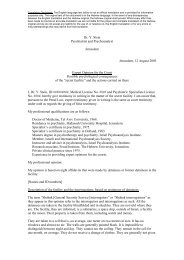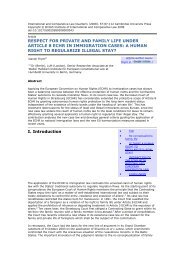HCJ 10650/03 Abu Gwella et. al v
HCJ 10650/03 Abu Gwella et. al v
HCJ 10650/03 Abu Gwella et. al v
Create successful ePaper yourself
Turn your PDF publications into a flip-book with our unique Google optimized e-Paper software.
129. As we have seen, the arrangement that preceded the government’s decision and the<br />
Law was not a procedure that automatic<strong>al</strong>ly granted a status in Israel to children of<br />
Israeli residents. Wh<strong>et</strong>her the child was born in Israel or outside the country, residency<br />
was granted at the discr<strong>et</strong>ion of the Minister of the Interior and in accordance with the<br />
“procedure for child registration” that was described above.<br />
130. For the sake of argument, l<strong>et</strong> us assume that there are purposes that can justify a<br />
filtering process relating to granting children permanent-resident status in Israel (for<br />
example, in the spirit of the judgment in Karlo, supra). Revoking the Respondents’<br />
discr<strong>et</strong>ion, such that no child over the age of 12 can obtain a status in Israel in any<br />
case, is an extreme action, which causes much greater harm than is necessary.<br />
131. The revocation of discr<strong>et</strong>ion <strong>al</strong>so contravenes basic concepts of law. An administrative<br />
authority must weigh the merits of exercising a power given it, and must exercise it<br />
reasonably, to the extent necessary, in good faith, in a non-arbitrary manner, without<br />
taking into account extraneous considerations, and giving proper consideration to<br />
fundament<strong>al</strong> rights and principles of our system of law (see Ra’anan Har Zahav,<br />
Israeli Administrative Law (5657 – 1996) 1<strong>03</strong>-109, 435-440, and the references<br />
provided there; <strong>HCJ</strong> 3648/97, Bijebahan P<strong>et</strong>el and Three Others v. Minister of the<br />
Interior and Three Others, Piskei Din 53 (2) 728, 770).<br />
This duty of the government authority is a fundament<strong>al</strong> norm of administrative law,<br />
and <strong>al</strong>so finds expression in the common law regarding the granting of a status to<br />
children. See <strong>HCJ</strong> 48/89, Issa v. District Office Administration <strong>et</strong> <strong>al</strong>., supra.<br />
Revoking the authorities’ discr<strong>et</strong>ion compels it to act arbitrarily.<br />
A law that requires the authorities to act arbitrarily, and compels the Respondent to be<br />
“m<strong>al</strong>icious with the backing of the law” undermines the foundation of administrative<br />
law, and the fundament<strong>al</strong> principle of individu<strong>al</strong> responsibility, and constitutes the<br />
worst kind of law for “sidestepping the High Court.” Such a law should be treated in<br />
only one way – by nullifying it.<br />
Collective sanctions<br />
132. By including requests for child registration with requests for family unification, in<br />
order to freeze their handling compl<strong>et</strong>ely, the law separates in gross fashion an entire<br />
group, based on nation<strong>al</strong> origin, and imposes a sweeping, dreadful decree, without<br />
distinction and without discr<strong>et</strong>ion. In effect, we have a collective sanction against<br />
hundreds, and possibly thousands, of innocent children.<br />
47









